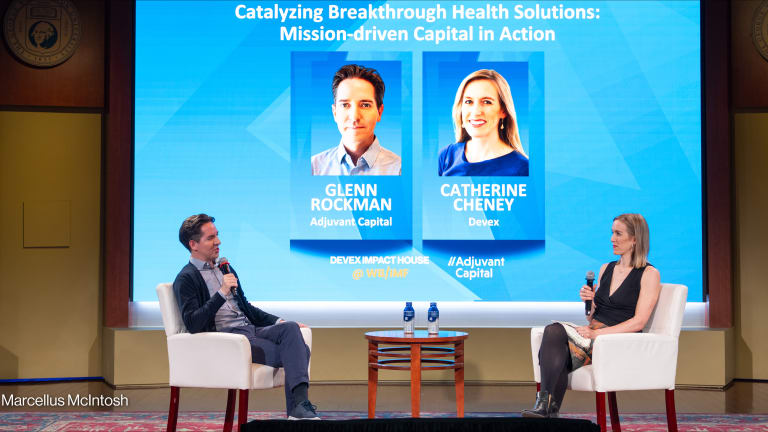Q&A: Ronald Cohen on moving to a financial system that measures impact

NEW DELHI, India — Ronald Cohen, who is recognized as a pioneer in venture capital and social finance, has a message for the finance industry: It’s time to shift from just evaluating risk and return, and add impact into investing calculations.
While questions remain about how to define impact investing, Cohen, who is the chairman of the Global Steering Group for Impact Investment, said they have a simple definition: an investment that measures impact as well as financial return.
The sector, however, faces many questions about how to measure that impact, and a variety of initiatives have popped up in response. Mainstreaming impact measurement will mean that eventually, there needs to be a consensus around definition and measurement — a process that venture capital and equity investing also had to go through, Cohen said.
That measurement is critical because what will push companies to measure and deliver impact is a comparison with other businesses, Cohen said, using a set of criteria that investors, management teams, and employees can use. While some skeptics believe that financial markets won’t change because the system doesn’t incentivize impact, Cohen disagrees and said that with pressure from millennials, who believe values matter, and from pension contributors starting to push fund managers, the system can change.
“They will drive big business, big business won't shift on its own, big business will shift because consumers and shareholders are making it shift,” Cohen said.
Devex sat down with Cohen at the GSG Impact Summit to talk about his vision for how to get financial markets to think in terms of risk, return, and impact.
This conversation has been edited for length and clarity.
Impact investing is still a niche part of the financial system, and as people in the development community look for ways to continue financing development, there are concerns that things aren’t moving fast enough to achieve the ambitious 2030 agenda.
Things are moving very fast. The environmental, social, governance investing area is growing much faster, so the challenge is to take this investment and apply measurement to it, to bring it within the definition of impact investment. And that's why being able to measure the impact of a company is so crucially important.
There are 150 different initiatives that have tried to define an approach to impact measurement and that have tended to focus on the measurement of individual impact for a specific intervention. If we want impact investments to really grow, where companies are the target investment, then we have to apply impact weighted financial accounts to compare the strictly financial performance of the business with an impact weighted performance.
You can use all the financial ratios all the techniques that we use to measure both financial return and risk to impact-weighted accounts. When you compare two companies and say they both make a billion dollars of profit, but on an impact-weighted basis one’s making $300 billion and the other one’s making $1.5 billion, then investors will begin to look at these companies in a different way.
“If you go down the line of saying every company has to manage its own process ... it doesn't give you a basis for comparison.”
— Ronald Cohen, chairman, Global Steering Group for Impact InvestmentWhat do you think the sector needs to do to get to the mainstreaming of impact investing?
We have two myths to explode, the first is that we can't measure impact and the social impact bond for the first time. By showing that you can connect impact to a financial return, proved that you could measure it.
And then the second is that if you strive for impact, you're gonna come out with worse profit — we're beginning to see examples of companies that are proving exactly the opposite, that you can grow faster and make more money because of impact.
What do you think the growth of the sector might mean for development finance?
I hope it will mean we're going to begin to see impact investment approaches applied by philanthropists and official aid agencies and corporations to invest in emerging markets and to the outcomes funds that we're setting up — 2 billion dollar outcomes funds for education.
They will be a first step to bringing new flows of investment capital to emerging markets and the outcomes fund we see as a vehicle that can be replicated a thousand times. So we see that as a new model to attract investment capital.
There is a lot of talk about the need for data and good metrics. What types of metrics do you think are needed?
My vision is that by the end of next year we can have a framework ready that says “this is how we go about establishing coefficients for assessing the impact of the sales of a company, of its employment, of its supply chain. And when you apply these coefficients you either increase the cost line or you increase the sales line, and then at the end, you apply governance coefficients to the impact-weighted profit. So you end up with impact weights that give you a new profit and loss.”
By the end of next year, we’ll have that set of metrics and that framework at least to say here's a definition, this is the way we get to the coefficients. Now we have to implement it. Then you will establish a new impact accounting board led by a very credible people — it'll be like the financial accounting board.
And you will come out with generally accepted impact principles and these impact accounting principles will evolve over time in the way that financial accounting has evolved. That's the destination because then you can use all of the techniques that we have to assess and compare, whereas if you go down the line of saying every company has to manage its own process for measuring the impact of its own activities, obviously that’s very laborious but also it doesn't give you a basis for comparison.
Editor’s note: The Global Steering Group for Impact Investment facilitated Devex's travel for this reporting. However, Devex maintains full editorial control of the content.
Search for articles
Most Read
- 1
- 2
- 3
- 4
- 5








